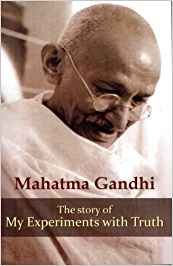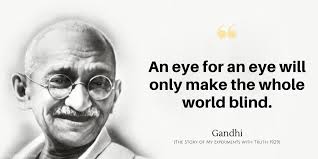The Story Of My Experiments With Truth
Author : MK Gandhi
Genre : Autobiography

An Autobiography or The Story Of My Experiments With Truth
“It is not my purpose to attempt a real autobiography. I simply want to tell the story of my numerous experiments with truth.”
“To describe truth as it has appeared to me, and in the exact manner in which I have arrived at it, has been my ceaseless effort.”- MK Gandhi
Gandhi used to say, “Happiness is when what you think, what you say and what you do are in harmony”. His whole life was an experiment to become a better human being: honest, transparent, truthful. While he externally led the Indian freedom struggle, internally he continued to lead an even bigger struggle: to understand his weaknesses and remove them. This book is about those experiments.

Lying, Meat-eating, Smoking and Stealing:
Gandhi recalls how he started eating meat, hiding it from his very conservative and totally vegetarian parents. He started smoking too under the influence of a friend. And stealing coppers from the servants to pay for these vices.
But Gandhi’s conscience continued to prick him and he suffered greatly with what he thought were double standards. Lying to his parents was simply not acceptable to him. Finally he stopped all this and wrote a confession and handed it personally to his father asking for adequate punishment. His father was suffering from fistula then and started crying and forgave his son. That was also Gandhi’s lesson in Ahimsa, the power of love to transform everything it touches.
He was also deeply moved by the play Harishchandra, and saw it many times. That sowed his deep faith in truthfulness and he vowed never to lie.
Parents and Elders:
He held deep respect, and was almost in awe, of his parents. He was thoroughly impressed with the story of Shravan Kumar who took care of his elderly parents till his own death. “I was, by nature, blind to the fault of elders” and continued to give equal respect to his teachers.
Marriage and Wife:
Gandhi, like others of his time, was married at the age of 13 on which he later said, “I can see no moral argument in support of such a preposterously early marriage”. But he also admits, “Everything on that day seemed to me right and proper and pleasing. There was also my own eagerness to get married”.
He “took no time in assuming the authority of a husband”, something his wife Kasturba resented and tried to exert her independence. There was some bitterness throughout their lives, since Gandhi was stubborn on what he considered right. Gandhi, in his quest to be a mahatma, was probably too harsh on her. He tried to “make her an ideal wife”, always a difficult proposition! He expected her to follow his high ideals. He got ‘untouchables’ in his house and expected Kasturba to care for them, something which the simple minded lady was always taught was against her religion. He abstained from all sex for the last 40 years of his life, which she thought was contrary to her duties as a wife. Or when gifts were given to her by the South African Indians, Gandhi returned it, while she wanted these gifts to be some safety for their children.
But overall, as a sign of those times, they continued together, and in later years, Kasturba became a full partner in Gandhi’s struggle for independence, fasting and leading rallies with him.

God and Religion:
Gandhi’s father was open minded and had friends from different religions who came and discussed their faith. From them, Gandhi learnt tolerance and respect for all religions. He was deeply devoted to Ramayana which he found the greatest book in devotional literature but, practically, was inclined towards atheism. The logical part of him found it hard to believe in the stories of creation in Manusmriti. He believed, instead, “in morality as the basis of things, and truth as the substance of morality”. Bhagwad Geeta, for him, “was an infallible guide of conduct.”

Non Violence:
Gandhi was assaulted in Durban, South Africa by the whites there (he was fighting for the rights of coloreds and Indians who, under apartheid by the white rulers, were treated as second class citizens). He refused to prosecute the assailants saying they were misled and harming them would not help the cause. He believed in removing root cause, not personal grievance.
Over time, his standing in South Africa increased considerably.

Ideal society, Tolstoy Farm:
In South Africa and then in India, Gandhi tried to start an ashram trying to emulate Tolstoy’s teachings of an ideal society. The entire ashram lived as one family and every need – schooling, food, production, etc.- was fulfilled within the group under Gandhi’s leadership. They also had their own newspaper. “All had their meals in a common kitchen and strove to live as one family.”
Untidiness:
At the Congress plenary session, Gandhi’s first impression was that of the complete lack of hygiene and cleanliness. So much so that, he felt if the convention had not ended, an epidemic would have broken out.
Even as he toured India, he felt “the villages were insanitary, the lanes full of filth, the wells surrounded by mud and stink and the courtyards unbearably untidy.” So a lot of his efforts went in teaching people the right way to live.
On a different note, he also talks of “Bad handwriting should be regarded as a sign of an imperfect education… Let every young man and woman be warned by my example, and understand that good handwriting is a necessary part of education.”
[Lesson for me there!]
Why should you read the book: The present generation has this love-hate relationship with the Mahatma. While everyone has grown up seeing him celebrated as the Father of the Nation, in today’s polarized and jingoistic world, often I hear people questioning his tolerance and simplicity. Understanding the mahatma is not for everyone (not even for his eldest son who became a drunkard and a debauchery). But I do think Gandhi was genuinely one of the greatest men India has ever produced. And in this book, we see how an ordinary person tries to become a mahatma by introspecting on his ‘sins’ and making an inspired effort to become better.
Goodreads Link: The Story Of My Experiments With Truth: An Autobiography of Mahatma Gandhi by Mahatma Gandhi | Goodreads

 This information will never be shared with third party
This information will never be shared with third party
The story of itself is pure magic!! But I loved how you conclude the book💯 would definitely going to read this book
Great insights in the life of mahatma gandhi, definitely gonna read the book!
Very well Concluded 👍